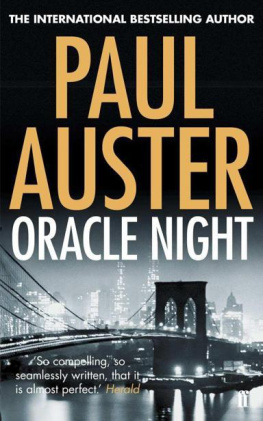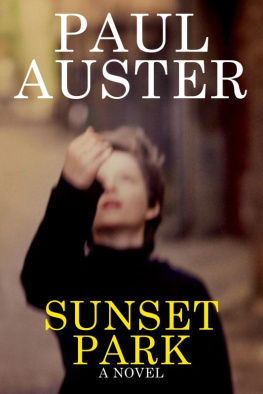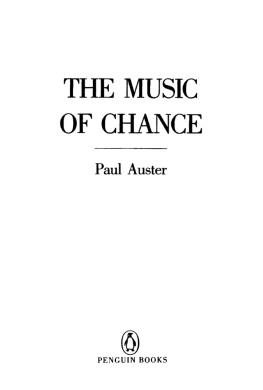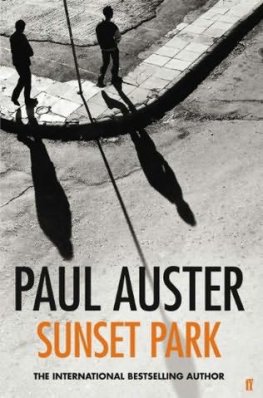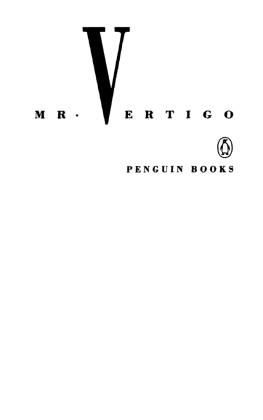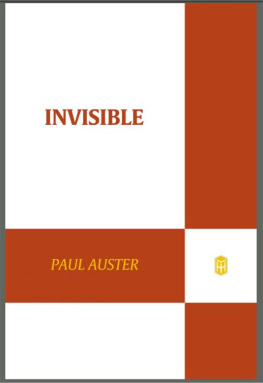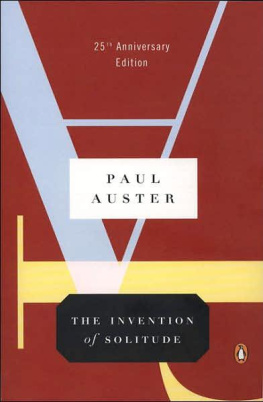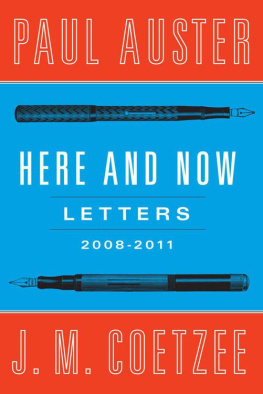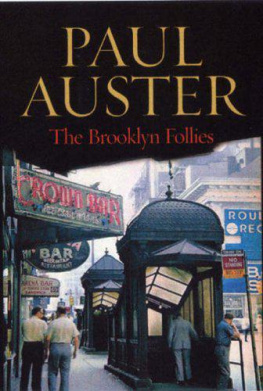Paul Auster - Oracle Night
Here you can read online Paul Auster - Oracle Night full text of the book (entire story) in english for free. Download pdf and epub, get meaning, cover and reviews about this ebook. year: 2009, publisher: Picador, genre: Detective and thriller. Description of the work, (preface) as well as reviews are available. Best literature library LitArk.com created for fans of good reading and offers a wide selection of genres:
Romance novel
Science fiction
Adventure
Detective
Science
History
Home and family
Prose
Art
Politics
Computer
Non-fiction
Religion
Business
Children
Humor
Choose a favorite category and find really read worthwhile books. Enjoy immersion in the world of imagination, feel the emotions of the characters or learn something new for yourself, make an fascinating discovery.
- Book:Oracle Night
- Author:
- Publisher:Picador
- Genre:
- Year:2009
- Rating:5 / 5
- Favourites:Add to favourites
- Your mark:
- 100
- 1
- 2
- 3
- 4
- 5
Oracle Night: summary, description and annotation
We offer to read an annotation, description, summary or preface (depends on what the author of the book "Oracle Night" wrote himself). If you haven't found the necessary information about the book — write in the comments, we will try to find it.
Oracle Night — read online for free the complete book (whole text) full work
Below is the text of the book, divided by pages. System saving the place of the last page read, allows you to conveniently read the book "Oracle Night" online for free, without having to search again every time where you left off. Put a bookmark, and you can go to the page where you finished reading at any time.
Font size:
Interval:
Bookmark:
PAUL AUSTER
Oracle Night

for Q.B.A.S.G.(in memory)
Table of Contents
I had been sick for a long time. When the day came for me to leave the hospital, I barely knew how to walk anymore, could barely remember who I was supposed to be. Make an effort, the doctor said, and in three or four months youll be back in the swing of things. I didnt believe him, but I followed his advice anyway. They had given me up for dead, and now that I had confounded their predictions and mysteriously failed to die, what choice did I have but to live as though a future life were waiting for me?
I began with small outings, no more than a block or two from my apartment and then home again. I was only thirty-four, but for all intents and purposes the illness had turned me into an old man one of those palsied, shuffling geezers who cant put one foot in front of the other without first looking down to see which foot is which. Even at the slow pace I could manage then, walking produced an odd, airy lightness in my head, a free-for-all of mixed-up signals and crossed mental wires. The world would bounce and swim before my eyes, undulating like reflections in a wavy mirror, and whenever I tried to look at just one thing, to isolate a single object from the onrush of whirling colors a blue scarf wrapped around a womans head, say, or the red taillight of a passing delivery truck it would immediately begin to break apart and dissolve, disappearing like a drop of dye in a glass of water. Everything shimmied and wobbled, kept darting off in different directions, and for the first several weeks I had trouble telling where my body stopped and the rest of the world began. I bumped into walls and trash bins, got tangled up in dog leashes and scraps of floating paper, stumbled on the smoothest sidewalks. I had lived in New York all my life, but I didnt understand the streets and crowds anymore, and every time I went out on one of my little excursions, I felt like a man who had lost his way in a foreign city.
Summer came early that year. By the end of the first week of June, the weather had turned stagnant, oppressive, rank: day after day of torpid, greenish skies; the air clogged with garbage fumes and exhaust; heat rising from every brick and concrete slab. Still, I pushed on, forcing myself down the stairs and out into the streets every morning, and as the jumble in my head began to clear and my strength slowly returned, I was able to extend my walks into some of the more far-flung crevices of the neighborhood. Ten minutes became twenty minutes; an hour became two hours; two hours became three. Lungs gasping for air, my skin perpetually awash in sweat, I drifted along like a spectator in someone elses dream, watching the world as it chugged through its paces and marveling at how I had once been like the people around me: always rushing, always on the way from here to there, always late, always scrambling to pack in nine more things before the sun went down. I wasnt equipped to play that game anymore. I was damaged goods now, a mass of malfunctioning parts and neurological conundrums, and all that frantic getting and spending left me cold. For comic relief, I took up smoking again and whiled away the afternoons in air-conditioned coffee shops, ordering lemonades and grilled cheese sandwiches as I listened in on conversations and worked my way through every article in three different newspapers. Time passed.
On the morning in question September 18, 1982 I left the apartment somewhere between nine-thirty and ten oclock. My wife and I lived in the Cobble Hill section of Brooklyn, midway between Brooklyn Heights and Carroll Gardens. I usually went north on my walks, but that morning I headed south, turning right when I came to Court Street and continuing on for six or seven blocks. The sky was the color of cement: gray clouds, gray air, gray drizzle borne along by gray gusts of wind. I have always had a weakness for that kind of weather, and I felt content in the gloom, not the least bit sorry that the dog days were behind us. About ten minutes after starting out, in the middle of the block between Carroll and President, I spotted a stationery store on the other side of the street. It was wedged in between a shoe-repair shop and a twenty-four-hour bodega, the only bright faade in a row of shabby, undistinguished buildings. I gathered that it hadnt been there long, but in spite of its newness, and in spite of the clever display in the window (towers of ballpoints, pencils, and rulers arranged to suggest the New York skyline), the Paper Palace looked too small to contain much of interest. If I decided to cross the street and go in, it must have been because I secretly wanted to start working again without knowing it, without being aware of the urge that had been gathering inside me. I hadnt written anything since coming home from the hospital in May not a sentence, not a word and hadnt felt the slightest inclination to do so. Now, after four months of apathy and silence, I suddenly got it into my head to stock up on a fresh set of supplies: new pens and pencils, new notebook, new ink cartridges and erasers, new pads and folders, new everything.
A Chinese man was sitting behind the cash register in front. He appeared to be a bit younger than I was, and when I glanced through the window as I entered the store, I saw that he was hunched over a pad of paper, writing down columns of figures with a black mechanical pencil. In spite of the chill in the air that day, he was dressed in a short-sleeved shirt one of those flimsy, loose-fitting summer things with an open collar which accentuated the thinness of his coppery arms. The door made a tinkling sound when I pulled it open, and the man lifted his head for a moment to give me a polite nod of greeting. I nodded back, but before I could say anything to him, he lowered his head again and returned to his calculations.
The traffic out on Court Street must have hit a lull just then, or else the plate glass window was exceedingly thick, but as I started down the first aisle to investigate the store, I suddenly realized how quiet it was in there. I was the first customer of the day, and the stillness was so pronounced that I could hear the scratching of the mans pencil behind me. Whenever I think about that morning now, the sound of that pencil is always the first thing that comes back to me. To the degree that the story I am about to tell makes any sense, I believe this was where it began in the space of those few seconds, when the sound of that pencil was the only sound left in the world.
I made my way down the aisle, pausing after every second or third step to examine the material on the shelves. Most of it turned out to be standard office-and school-supply stuff, but the selection was remarkably thorough for such a cramped place, and I was impressed by the care that had gone into stocking and arranging such a plethora of goods, which seemed to include everything from six different lengths of brass fasteners to twelve different models of paper clip. As I rounded the corner and began moving down the other aisle toward the front, I noticed that one shelf had been given over to a number of high-quality imported items: leather-bound pads from Italy, address books from France, delicate rice-paper folders from Japan. There was also a stack of notebooks from Germany and another one from Portugal. The Portuguese notebooks were especially attractive to me, and with their hard covers, quadrille lines, and stitched-in signatures of sturdy, unblottable paper, I knew I was going to buy one the moment I picked it up and held it in my hands. There was nothing fancy or ostentatious about it. It was a practical piece of equipment stolid, homely, serviceable, not at all the kind of blank book youd think of offering someone as a gift. But I liked the fact that it was cloth-bound, and I also liked the shape: nine and a quarter by seven and a quarter inches, which made it slightly shorter and wider than most notebooks. I cant explain why it should have been so, but I found those dimensions deeply satisfying, and when I held the notebook in my hands for the first time, I felt something akin to physical pleasure, a rush of sudden, incomprehensible well-being. There were just four notebooks left on the pile, and each one came in a different color: black, red, brown, and blue. I chose the blue, which happened to be the one lying on top.
Font size:
Interval:
Bookmark:
Similar books «Oracle Night»
Look at similar books to Oracle Night. We have selected literature similar in name and meaning in the hope of providing readers with more options to find new, interesting, not yet read works.
Discussion, reviews of the book Oracle Night and just readers' own opinions. Leave your comments, write what you think about the work, its meaning or the main characters. Specify what exactly you liked and what you didn't like, and why you think so.

